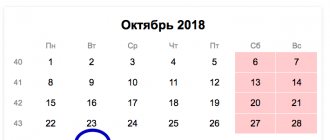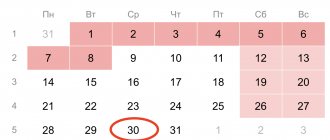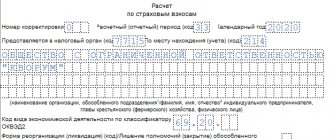In what situations do requests for explanations come?
Letters from the tax department about explanations for accrued and paid insurance premiums are not that uncommon. They are usually caused by the fact that tax inspectors did not like something in the reporting submitted to them, for example, they found inconsistencies in the documents submitted by the organization with their own data, or they discovered some erroneous or unreliable information. In particular, doubts may arise in situations where there has been a noticeable decrease in an employee’s salary compared to previous years, when the amount of personal income tax in the 2-NDFL certificate is not identical to the tax payment that “went” to the budget, or a discrepancy between the indicators in the 2-NDFL certificates and the form has been discovered 6-NDFL, etc.
- Form and sample
- Free download
- Online viewing
- Expert tested
FILES
At the same time, the main parameters that tax authorities pay attention to when monitoring insurance premiums are the total amount of payments made by the organization for its employees.
When to Provide Explanations
When conducting an inspection, the inspector has the right to request written explanations. Situations in which taxpayers are required to explain the result of control are spelled out in paragraph 3 of Art. 88 Tax Code of the Russian Federation:
- Errors in submitted reports. For example, inaccuracies or inconsistencies are identified in the declaration. In this case, tax authorities require you to provide justification for these discrepancies or send a corrective report.
- In the adjusting statements, the amounts payable to the budget are significantly lower than in the initial calculations. In such a situation, the inspector will suspect a deliberate understatement of the tax base and payments and will demand an explanation for the changes.
- The submitted income tax return reflects losses. In any case, you will have to justify unprofitable activities to the Federal Tax Service, so prepare a letter with explanations in advance.
The inspection request must be responded to within 5 working days from the date of official delivery of the request - such norms are enshrined in clause 3 of Art. 88, paragraph 6 of Art. 6.1 Tax Code of the Russian Federation. In special cases, the Federal Tax Service will have to notify the receipt of a tax request (letter of the Federal Tax Service of the Russian Federation dated January 27, 2015 No. ED-4-15/1071).
IMPORTANT!
Some requests from the Federal Tax Service do not have a stamp. You will still have to respond to such demands - such instructions are given in the letter of the Federal Tax Service of the Russian Federation dated July 15, 2015 No. ED-3-2 / [email protected]
Allowed sending methods
There are two ways to submit an explanation to the tax authorities. If the company uses an electronic reporting form, then the explanation must be transmitted in this way, otherwise it will not even be considered.
But if an enterprise uses the right to submit reports on paper, then an explanation can be generated on paper and then taken to the tax office in person. If it doesn’t work out in person - no problem, you can send the document through an authorized person (provided that he has a notarized power of attorney) or by regular mail - the date of submission of the explanation in this case will be considered the date when the letter was accepted by the postal employee services.
What happens if you do not respond to requests for clarification?
Sometimes employees of organizations, for some reason, do not consider it necessary to respond to letters from the tax authority or, out of absent-mindedness, simply forget to do so. Previously, the legislation did not provide for any sanctions for this, but from January 1, 2017, tax authorities received the right to fine enterprises for failure to provide explanations.
Moreover, the fine is quite large: for the first time it is 5 thousand rubles, but if the tax agent commits such a violation again, the amount will increase to 20 thousand rubles.
In addition, we should not forget that employees of the supervisory agency may interpret the taxpayer’s silence in their own way, as a result of which the enterprise may be placed on the schedule of the next on-site tax audits. And this is a more serious danger, because based on the results of such control measures, companies are often subject to more serious administrative penalties (especially relevant, given that there are some flaws in the work of almost any organization).
Is there a fine possible if the requirement is ignored?
Tax liability for failure to comply with the inspection's requirement to provide explanations to the Tax Code of the Russian Federation has not been established. Art. 126 of the Tax Code of the Russian Federation does not apply to this situation, since we are not talking about the requisition of documents (Article 93 of the Tax Code of the Russian Federation), but Art. 129.1 is not applicable, since this is not a counter check (Article 93.1 of the Tax Code of the Russian Federation).
Administrative liability under Art. 19.4 of the Code of Administrative Offenses of the Russian Federation in this case cannot be attracted either. This article applies for failure to appear at the tax authority, and not for refusal to give explanations, which the Federal Tax Service of the Russian Federation itself draws attention to (see clause 2.3 of the letter of the Federal Tax Service of Russia dated July 17, 2013 No. AS-4-2/12837).
Thus, tax authorities have no right to fine people for failure to submit explanations. But still, despite the absence of legal grounds for the fine, it is more appropriate to provide explanations, since this is in the interests of the taxpayer himself. After all, refusal to do so may result in additional tax charges and sanctions, which will then require time and money to appeal.
We invite you to familiarize yourself with: Sample complaint against the tax office
For information on the procedure for requesting clarification during an on-site audit, read the article “How tax authorities request clarification from a taxpayer.”
For information on the procedure for requesting clarification during an on-site audit, read the article “How tax authorities request clarification from a taxpayer.”
How to write an explanation
An explanation of insurance premiums can be written in any form - there is no unified standard. It is recommended that its structure and content comply with the norms and rules adopted for business papers.
It is very important that the explanation clearly describes the reasons for the problem for which tax representatives contacted the company. They need not only to be identified, but also to be argued. In this case, the evidence base should consist not only in words, but also in the presence of relevant supporting papers.
How to prepare an explanation on paper
For explanations, you can take a regular sheet of paper or a form with company details, but it is better not to write them by hand, but to print them on a computer. After final formation, the document must be signed - it is good if the document contains two autographs: the director and the chief accountant. The explanation should be made in two identical copies, one of which must be sent to the place of request, and the second must be kept with you. If the accounting policy of an enterprise indicates the use of a seal in its current activities, the letter should be endorsed with its help. In the journal of outgoing documentation, you must make a note about the explanation sent (indicating its number and date).
Sample explanation to the tax office
If you have received a request from the tax office to provide an explanation regarding insurance premiums, and you have never made such documents before, look at the example below and read the comments to it - with their help you will probably be able to formulate the letter you need.
- First of all, indicate the addressee in the explanation, i.e. the tax office for which the explanation is intended. Then enter information about the organization in more detail: write its name, details, contact information (address, telephone), be sure to mark the outgoing number of the message. After this, you can move on to the main section.
- First, provide here a link to the number and date of the request that came from the supervisory authority, then begin to formulate the actual explanations. In each specific situation, they depend on what particular circumstances led to questions from tax specialists. But in any case, give an explanation both descriptively (for example, if technical problems or incorrect work of an accountant led to the error, write it down) and documented.
- When referring to documents, indicate their numbers and date of creation. If the reason for which the tax authorities have questions has already been corrected, be sure to note this, as well as the fact that in the future you will take all measures to prevent such situations.
- Finally, be sure to sign the form.
Features of the preparation of explanations for insurance premiums
What the FSS checks: timely payment of insurance premiums, correct expenditure of funds for social insurance purposes.
What will be required: pay slips, copies of payment orders, certified copies of documents confirming the validity and correctness of the insured’s expenditure of funds (sickness certificates, salary certificates, etc.).
https://www.youtube.com/watch{q}v=tH7EjpDcIeY
What to do and how to explain: within ten days from the date of receipt of the request, prepare certified copies of documents and submit them to your branch of the Fund.
Dear readers! Our articles talk about typical ways to resolve legal issues, but each case is unique.
If you want to find out how to solve your particular problem, please use the online consultant form on the right or call the numbers provided on the website. It's fast and free!
Explanations regarding insurance premiums must be submitted to the tax office within 5 working days from the date of receipt of the request. It is mandatory to submit explanations to the Federal Tax Service, since according to clause 1 of Art. 129.1 of the Tax Code of the Russian Federation, an economic entity will be fined 5,000 rubles. for untimely notification or failure to provide the necessary information to the Federal Tax Service. Repeated acts of this kind are punishable by fines in the amount of 20,000 rubles.
When requesting explanations on the DAM, they must be submitted along with an updated calculation in which any errors found will be corrected. However, this requirement is not always related to the fact that there are any violations, errors or inaccuracies in the DAM. Tax authorities may request clarification even if there are doubts about the correctness of determining the amount of insurance premiums, as well as if the amount of insurance premiums has been reduced compared to the previous period.
In addition, clarification may be required if the company applies a reduced rate of insurance premiums or reflects non-taxable amounts in the DAM. Also, in the event of a discrepancy between the information in the DAM and 6-NDFL, the payer of insurance premiums will need to explain the reason for the differences.
It is necessary to pay attention to the following important points:
- the explanation is submitted in response to a request from the tax inspectorate;
- The legislation does not establish a sample of explanations, and therefore they are drawn up in any form. As a rule, the explanations contain characteristics inherent in the company's business papers;
- Explanations must be sent no later than 5 days from the date of receipt of the request to the Federal Tax Service Inspectorate from which the request came;
- Explanations on insurance premiums can be transmitted electronically through TKS, during a personal visit to the tax office, through an authorized representative (with the execution of a notarized power of attorney) or by Russian Post;
- date of submission of the explanation:
— for an electronic document — date of sending;
- for transfer personally or by an authorized person - for direct transfer to a tax inspector;
— for sending by mail — the date of acceptance by an employee of the Russian Post;
- If an explanation is not provided, the company can expect not only a fine, but also its inclusion in the schedule of on-site tax audits.
Explanations on insurance premiums can be submitted to the Federal Tax Service on several grounds, which we will consider in more detail.
The company does not submit any application to the Federal Tax Service to establish the right to use a reduced tariff for insurance premiums, and tax authorities see this information on the DAM. To confirm this right, they can send a request to provide documents on the basis of which preferential rates for insurance premiums are used.
Their list depends on what taxation system the business entity uses and what its activities are. For example, a copy of KUDiR, a copy of a certificate of residence in a special economic zone, payment documents, copies of documents on the right to conduct a certain type of activity, etc. can be presented as evidence.
Supporting documents can be issued either electronically or on paper, depending on how the explanations upon request are sent. In addition, they must be drawn up as attachments to the explanation sent.
When calculating the base for insurance premiums, non-taxable amounts are excluded from it, and to confirm the right to use them, the tax office may request various documents, for example, on sick leave, provision of daily allowances, when paying child benefits, etc.
We suggest you read: Tax deduction for mother's care
When drawing up an explanation, you must indicate in detail the grouping of non-taxable payments and the amounts for them, and use copies of available documents for confirmation.
All policyholders must submit calculations for insurance premiums, regardless of whether insurance premiums have been accrued or paid or not. In the absence of accruals for contributions, a zero DAM is formed, about which tax authorities may have certain doubts, and then they will send a request for clarification.
As an explanation for the lack of accrual of insurance premiums, one can indicate the reason - suspension of activities and payment of wages. Such an explanation can be sent along with a zero calculation for insurance premiums in order to prevent further questions from the tax office.
When drawing up and filing explanations on insurance contributions to the tax office, you must adhere to the following main points:
- indicate the reasons why the tax inspectorate sent a request for clarification;
- argue in connection with which specific problems controversial issues arose;
- indicate and present the evidence base on which the policyholder insists on his position;
- draw up explanations on company letterhead with all the necessary details;
- fill out the paper version of the explanations in printed rather than handwritten form;
- sign the explanations not only of the director, but also of the chief accountant;
- draw up a paper version in two copies: give one of them to the tax office employees, and put a mark of receipt on the second;
- register the document in the journal of outgoing documentation, indicating its number and date.
Letter to the Federal Tax Service to fill out a questionnaire after the inspection. Tax officers actively come for inspections during desk VAT audits. They acquired this right in 2015 (clause 1 of Article 92 of the Tax Code of the Russian Federation). An inspection is ordered if the tax in the declaration is claimed for reimbursement or the inspection reveals discrepancies with the data in the counterparty’s reporting. And such inconsistencies are found on every second inspection.
Inspectors combine inspection with interrogations. For example, they may ask questions to employees and contractors who perform work in the office. After the visit, they are often given a questionnaire and the same questionnaire is sent to the counterparty.
To ensure that the event goes smoothly, it is safer to instruct employees in advance how to respond to inspectors. And at the same time, find out from your counterparties whether they will fill out the questionnaire and what they will write there. It is safer for the supplier and buyer to have the same answers.
You can refuse the inspectors, because the Tax Code of the Russian Federation does not provide for any questionnaires. However, the inspectorate has the right to call employees for questioning even within a chamber (Article 90 of the Tax Code of the Russian Federation, letter of the Ministry of Finance of Russia dated November 30, 2011 No. 03-02-07/1-411).
Letter from the INFS on the provision of invoices, purchase and sales books. When checking VAT returns, inspectors request invoices, purchase and sales books. Many people wonder why inspectors need this information if everything is already in the declaration. But the reporting includes only information from books and invoices.
We invite you to familiarize yourself with: Sample power of attorney to receive tax extract. Power of attorney to receive an extract from the Unified State Register of Legal Entities
Letter to the INFS regarding the provision of documents on transactions not subject to VAT. During VAT inspections, inspectors request documents on non-taxable transactions. For example, if an organization issues loans, they require confirmation of exemption under Article 149 of the Tax Code of the Russian Federation.
Inspectors motivate such requests by the fact that they have the right to demand documents confirming the right to benefits (clause 6 of Article 88 of the Tax Code of the Russian Federation). But issuing loans is not a tax benefit. These transactions are exempt from taxation regardless of which company makes the transactions (subclause 15, clause 3, article 149 of the Tax Code of the Russian Federation).
This means that inspectors do not have the right to demand documents, referring to paragraph 6 of Article 88 of the Tax Code of the Russian Federation. The judges also agree with this (resolution of the Arbitration Court of the North-Western District dated February 19, 2015 No. F07-1155/2014). Therefore, in the tax office’s response, you can politely refuse to provide documents (see the response to the tax office’s VAT requirements, sample).
See below for formalized letters for the VAT tax office 2021.
Response to the INFS requirement: sample for providing an explanation of an error in the VAT codes. Inspectors will ask for clarification if the supplier registers an invoice with code 26, and the buyer with code 01. Such verification rules existed before, but now the Federal Tax Service has officially formalized them in letter dated September 20, 2016 No. SD-4-3/17657.





